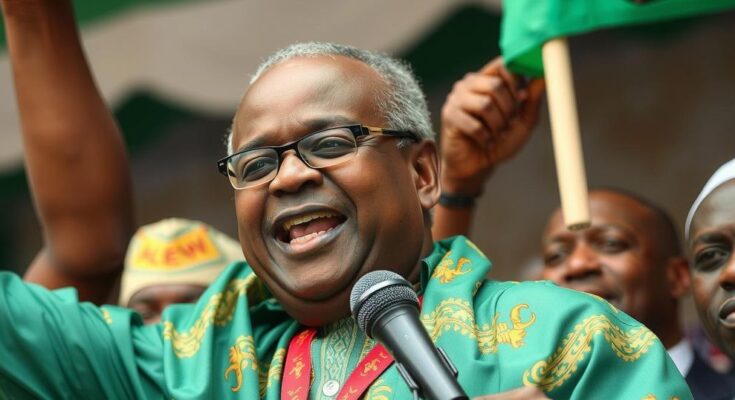Former President John Dramani Mahama has won Ghana’s presidential election, defeating Vice President Mahamudu Bawumia, who conceded the election results. Mahama’s victory marks a historic comeback, making him the first leader to reclaim the presidency in Ghana’s Fourth Republic after being voted out. His campaign focused on economic recovery and corruption reform, reflecting the electorate’s desire for substantial change amidst ongoing economic challenges.
In a significant turn of political events, former President John Dramani Mahama has triumphed in Ghana’s presidential election, as his chief opponent, Vice President Mahamudu Bawumia, has accepted defeat. During a news conference, Bawumia articulated, “The people of Ghana have spoken, the people have voted for change at this time and we respect it with all humility.” Mahama has notably reclaimed the presidency, becoming the first leader to do so since Ghana’s return to multi-party democracy in 1992, despite being previously voted out from office in January 2017.
The election results reveal Mahama’s dominance, with internal reviews from the National Democratic Congress (NDC) indicating he garnered 56.3 percent of the votes compared to Bawumia’s 41.3 percent. “It is very clear the people of this country have voted for change,” proclaimed NDC spokesman Sammy Gyamfi. This electoral outcome signifies a notable transition away from the governing New Patriotic Party (NPP), led by President Nana Akufo-Addo, amidst an economic crisis characterized by soaring inflation and significant debt challenges.
As joyous supporters convened in Accra to celebrate, Mahama responded on social media to Bawumia’s congratulatory phone call regarding his “emphatic victory.” Throughout his campaign, Mahama assured voters of his commitment to rectify the country’s economic and social challenges, aiming to resonate particularly with the youth.
In addition to addressing economic recovery, Mahama has proposed the establishment of an office dedicated to scrutinizing government procurement exceeding $5 million, a move intended to combat corruption, which he identified as a major concern.
Moreover, in light of the international community’s reactions, Mahama openly showed his support for Ghana’s anti-LGBTQ bill that had been passed by parliament but remains unsigned. As Ghana’s Election Commission prepares to release official results soon, the electorate is keenly observing this pivotal moment in the nation’s political landscape.
The political climate in Ghana has been historically characterized by stability, with a regular alternation of power between the two dominant parties, the New Patriotic Party (NPP) and the National Democratic Congress (NDC), since the reinstatement of multi-party democracy in 1992. The recent election marks a critical juncture as Mahama, who previously served as President from July 2012 to January 2017, returns to office after navigating significant charges against the outgoing administration related to economic mismanagement, including high inflation and a currency crisis which led to an International Monetary Fund bailout. The ongoing discourse surrounding governance challenges, including corruption and social issues, further frames the context of this electoral battle, underscoring the urgency for change as articulated by the electorate.
In conclusion, John Mahama’s victory symbolizes a historic shift in Ghana’s political landscape, particularly following economic adversities under the previous administration. As he assumes office once more, his commitments to economic reform and anti-corruption measures resonate with the electorate’s demand for change. This election not only reinforces Ghana’s democratic values but also highlights the people’s aspirations for accountability and improved governance as they move toward recovery from recent economic hardships. Mahama’s approach will be pivotal in addressing these pressing issues in the months ahead.
Original Source: www.aljazeera.com




